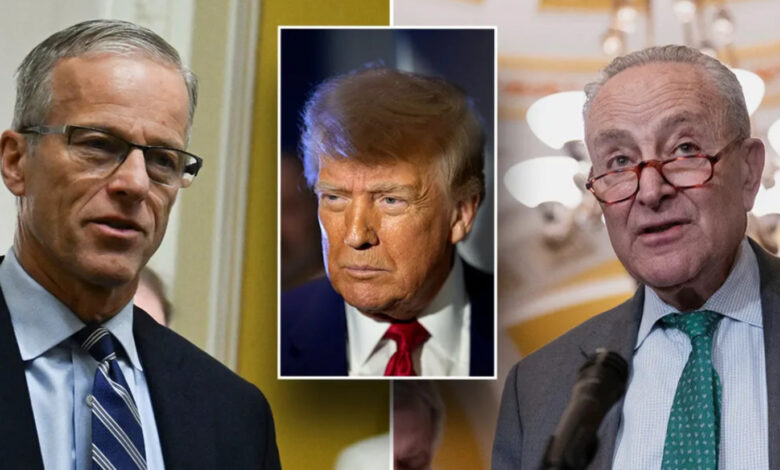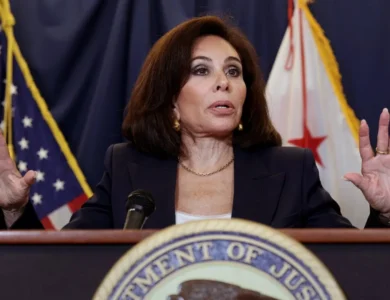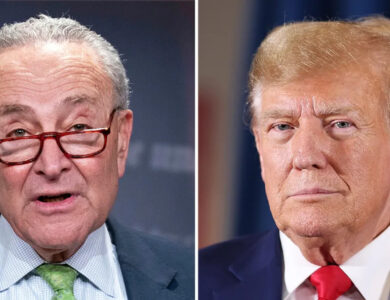Trump Pushes House To Pass Stablecoin Bill In Milestone For Crypto Industry

Senate Republicans and President Donald Trump are attempting to jam the House again. This time, it’s all about cryptocurrency.
The looming conflict, like the megabill saga, is over how large and how soon Hill Republicans should fulfill one of Trump’s most famous campaign promises. In this instance, the emphasis lies on Trump’s commitment to establishing the United States as the global hub for cryptocurrency.
The Senate enacted a bipartisan bill last month to bolster a certain segment of the crypto ecosystem—so-called stablecoins—but the House GOP is now debating whether to go farther. It’s preparing for a full-fledged “crypto week” to make its case when House lawmakers return next Monday.
House Republicans, who spent years developing crypto legislation that Senate Democrats refused to touch, want to vote on the Senate stablecoin measure as well as a broader “market structure” plan to alter securities and commodities regulations governing crypto trade.
The main obstacle for House Republicans is that Trump and Senate Republicans are opposed to changing the stablecoin bill or utilizing it as a vehicle to take a broader stance on crypto policy. Trump expresses his desire for a swift passage of a “clean” version of the law, but key GOP senators have indicated that they will not vote on a market structure change until September.
Senate Republicans believe it would be nearly impossible to persuade Democrats to adopt a revised stablecoin measure.
“For me to get eight or nine Democrats to vote for something here is extraordinarily difficult to do,” said Sen. Bill Hagerty (R-Tenn.), the lead sponsor of the Senate stablecoin bill, known as the GENIUS Act.
House GOP leaders said last week they won’t try to merge that legislation with their larger overhaul, but they haven’t said if they’ll change the bill. House Financial Services Chair French Hill’s massive market structure bill, the centerpiece of the House GOP’s crypto drive, is also the topic of last-minute negotiations among House legislators before next week’s floor vote.
In a landmark vote for the digital asset sector, the U.S. Senate approved a bill to establish a regulatory framework for cryptocurrency tokens known as stablecoins that are tethered to the US dollar.
With several Democrats joining the majority of Republicans in supporting the proposed government regulations, the bill, known as the GENIUS Act, passed with bipartisan support by a vote of 68-30, Reuters noted.
The bill must first pass the Republican-controlled House of Representatives before it can be given to President Donald Trump for approval.
“It is a major milestone. It establishes, for the first time, a regulatory regime for stablecoins, a rapidly developing financial product and industry,” said Andrew Olmem, a managing partner at law firm Mayer Brown and the former deputy director of the National Economic Council during Trump’s first term.
Crypto traders frequently utilize stablecoins, a kind of cryptocurrency created to maintain a steady value, typically a 1:1 dollar peg, to transfer money between tokens. Stablecoins, according to their proponents, can facilitate immediate payments and have seen a significant increase in use in recent years.
The stablecoin bill, if it becomes law, would mandate that tokens be backed by liquid assets, such as short-term Treasury bills and US dollars, and that issuers reveal to the public the makeup of their reserves every month.
The cryptocurrency sector has long advocated for lawmakers to enact laws establishing regulations for digital assets, claiming that a well-defined framework may facilitate the wider use of stablecoins. The industry attempted to portray the issue as bipartisan and invested over $119 million in supporting pro-crypto congressional candidates in the previous year’s elections.
The House passed a stablecoin measure last year, but the Senate, then controlled by Democrats, did not take it up, and it died.
After seeking cryptocurrency revenue throughout his presidential campaign, Trump has attempted to significantly alter U.S. cryptocurrency regulations.
Bo Hines, the head of Trump’s Council of Advisers on Digital Assets, stated that the White House aims to pass a stablecoin measure by August.





